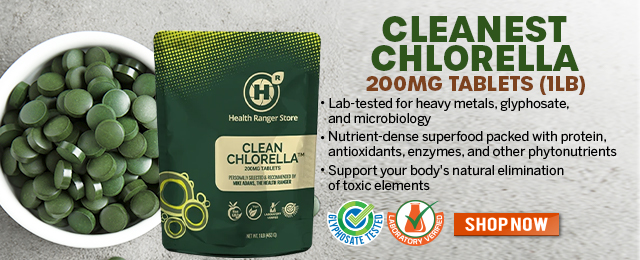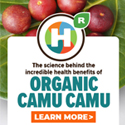
Hibiscus Tea Significantly Lowers Blood Pressure
Friday, April 10, 2009 by: David Gutierrez, staff writer
Tags: hibiscus, health news, Natural News
- Brushing with poison: Study finds toxic heavy metals in 90% of toothpaste brands, including those for children
- The truth about Benzyl Alcohol in beauty products
- X-class solar flare sparks worldwide disruptions, with more storms expected as sunspot turns toward Earth
- Hidden poison in your medicine and supplements: How phthalates in capsules are silently attacking your heart, thyroid, and hormones
- DOJ targets controversial “Proximal Origin” study in push for scientific transparency
- HHS launches Generation Gold Standard, ushering in UNIVERSAL FLU VACCINE spearheaded by Bill Gates
- China's sodium battery revolution sparks global EV rivalries and resets market rules
- Australia’s vaccine cover-up: 35 died same day as COVID shot, but authorities ignored them
- Gaddafi's prophecy unfolds: How NATO's destruction of Libya fueled Europe's migration crisis
- EU court exposes secret Pfizer deal, orders von der Leyen and Bourla to reveal concealed texts
- OUTRAGE: Georgia shields pesticide giants from cancer lawsuits as corporate lobbying silences victims
- Breakthrough study links mRNA vaccines to irreversible female fertility loss
- FDA cracks down on unapproved fluoride drugs for kids as science exposes decades of deception
- Renegade cardiologist joins MAHA, demands immediate halt to mRNA vaccines and overhaul of US health policies
- Canada's COVID cover-up: Health officials swore secrecy to protect Trudeau from vaccine scandal
- Sitting too much? New study reveals even exercise can't fully offset brain shrinkage risk
- Lard: A highly nutritious but misunderstood superfood
- LAB MUTATED PORK: The CRISPR pigs are gene-edited and heading to your dinner plate
- Singapore's draconian vaccine mandate: Citizens face jail time for refusing FORCED medical procedures that do HARM
- WAR ON COGNITION: The Coordinated Assault on Your Brain and How to Defend Yourself Against Every Attack
- Big Pharma's Dirty Secret: How Prescription Drugs Are Starving Your Body of Essential Nutrients
- JESUS NEVER SPOKE ENGLISH: Historical facts on why the Bible you’re probably reading has been altered, redacted or hidden from much of its original meaning
- Canada's COVID cover-up: Health officials swore secrecy to protect Trudeau from vaccine scandal
- RED ALERT: Nuclear War Between India and Pakistan Could Trigger Global Catastrophe… full RISK ANALYSIS
- Gene-edited pork sneaks onto your plate: FDA quietly approves CRISPR pigs amid health and ethical concerns
- Silent catastrophe: COVID-19 vaccines linked to plummeting fertility rates, Czech data reveals
- Nicole Shanahan exposes RFK Jr.'s 'Broken Promise' - Claims Surgeon General Pick Casey Means is a 'Manchurian Asset' in shocking allegation
- EU embraces censorship over solutions as energy grid crises spark blackout fears
- Why All Government Officials and Big Tech CEOs Who Engage in Systematic Viewpoint Censorship Must Be ARRESTED, Prosecuted, and Sentenced to Life in Prison
- Texas governor threatens San Marcos over pro-ceasefire resolution, igniting free speech debate
- Polar ice rebounds confound alarmist predictions: New studies highlight climate's unpredictable dance
- Survival basics: 5 Dangerous locations to avoid during an EMP attack
- Health Ranger Report: Christopher Bjerknes challenges conventional narratives about world history
- Landmark study of 85 million reveals shocking surge in heart attacks, strokes, and sudden death following the notorious COVID-19 jab
- Spike protein found in stroke victims’ brains up to 17 months after injection, study reveals
- Virologist who endorsed HCQ for COVID-19 appointed to top pandemic post at HHS
- The Miraculous Healing Power of DMSO: Nature's Forgotten Cure for Cancer, Pain, and Regeneration
- Biblical truth: God will carry out a “cosmic reset” of Earth and destroy all human civilization with a series of extinction-level cosmic impacts known as The Seven Trumpets, Seven Bowls and Seven Seals
- URGENT REPORT: The China Import Embargo - What to Stockpile Now Before America Runs Out
- The Ultimate Survival Guide to Baking Soda: A Miraculous, Multi-Purpose Remedy for Health, Home, and Emergency Preparedness
- Widespread social and economic unrest: Steve Quayle issues urgent financial warning of imminent asset collapse in new interview with Mike Adams
- Aerosolized bioweapons? Strange “diploid biomasses” falling out of the sky in Florida captured under the microscope
- A call to preserve America’s future: “Defeating Big Government Socialism” by Newt Gingrich
- Stunning Visualization of the Seven Trumpets in the Book of Revelation
- Big Pharma launches “Vaccine Integrity Project” to combat Secretary Kennedy and keep 94 shots going into kids with mandates and liability protections
- World Economic Forum's current downfall exposes legacy of totalitarianism, financial fraud, and crimes against humanity
- Biden regime deployed over 600 grants to fund disinformation agenda, to silence the truth and stifle debate
- The Miraculous Healing Power of Green Tea: Unlocking the Potent Antioxidants That Big Pharma Doesn't Want You to Know About
- Russia escalates censorship war, targets over 200 VPN apps amid Google resistance
- Kiss Your Genetic Privacy Good-Bye! 23andMe Gets Green Light to Sell Your Intimate Genetic Details to Anyone They Want
- The unspoken truth about chemotherapy: These “treatments” create toxic time bombs in your body called CELL-KILLING PARTICLES
- A win for free speech: State Department SHUTS DOWN controversial disinformation office
- U.S. Government's Bio-War Against America: 15 Historical Medical Horrors Inflicted on the American People by the Government Itself
- U.S. demands U.K. protect FREE SPEECH, repeal hate speech authoritarianism, in latest trade deal negotiations
- Red Cross issues warning to stop blood plasma donations from vaccinated people
- Scientists confirm: GENIUS brain function can be spontaneously unleashed in humans without any apparent cause
- EPA advisor admits the agency is funneling billions to climate groups ahead of Trump’s return to White House
- HYSSOP: What research reveals about the health benefits of this ancient holy herb
- Two containers with completed ballots fall out of truck in Florida
- Newly released JFK files reveal Pentagon's role in creating Lyme disease and covid in the same lab
- Mike Adams releases country western hit single: Goin’ Back in Time is Comin’ Home
- Global leaders unite to clamp down on “misinformation” with UN-backed Cascais Declaration
- BREAKING: 2025 NDAA authorizes mandatory military draft of WOMEN across America… as Pentagon pursues global NUCLEAR war with both Russia and China at the same time
- I Want My Bailout Money – new song released by Mike Adams
- Michael Yon warns of a ZIONIST TAKEOVER in Trump’s second administration
- The Health Ranger releases “Vaccine Zombie” song and music video, using AI-animated zombies for the music video
- Ozempic and Wegovy weight loss drugs are injectable LIZARD VENOM PEPTIDES that may unleash a devastating wave of organ failure… side effects align with symptoms of SNAKE BITES
- BOMBSHELL: DNA testing kits are a SCAM to develop ethnic-specific bioweapons
- These 13 countries just signed an agreement to engineer a global FAMINE by destroying food supply
- Israeli soldiers accused of even more torture and abuse in the West Bank
- RFK Jr. clears key hurdle: Sen. Susan Collins backs controversial HHS nominee, signaling a new era for health policy
- Sermon 30: How Jesus reveals Caesar’s FAKE CURRENCY and FALSE AUTHORITY
High blood pressure is a dangerous health condition that triples the risk of heart attack and is responsible for 60 percent of all strokes. The condition is very common in the developed world; one in three people in the United Kingdom, for example, are considered to suffer from high blood pressure.
Researcher Diane McKay and colleagues conducted the study on 65 people between the ages of 30 and 70 whose high blood pressure levels placed them at increased risk of kidney disease, heart attack and stroke. Participants were assigned to drink either hibiscus tea or a placebo three times per day for six weeks.
At the end of the study, blood pressure levels had fallen an average of 7.2 percent in the hibiscus group, compared with only 1.3 percent in the placebo group. Some patients in the hibiscus group actually experienced a 13.2 percent reduction.
"Hibiscus is now the most promising herb for treating blood pressure," said alternative medicine expert Andrew Weill. "Studies have found that people who drank two cups of hibiscus daily for four weeks lowered their diastolic blood pressure by 12 percent -- results similar to those for common blood pressure medication."
Scientists do not know exactly what compounds in hibiscus contribute to its protective effect, but the flowers are known to contain chemicals known as anthocyanins, which have been shown to improve the functioning of blood vessels and strengthen the protein collagen, which helps give structure to cells and tissues, including blood vessels.
Anthocyanins and other components of hibiscus tea are also known to function as antioxidants, cleansing the body of dangerous free radicals that can have been linked to heart disease, cancer and the symptoms of aging.
Beverages made or flavored from the flowers of the plan Hibiscus sabdariffa are popular in many African, Asian and Caribbean countries.
Sources for this story include: www.telegraph.co.uk; www.express.co.uk.
Hibiscus at FETCH.news
Get independent news alerts on natural cures, food lab tests, cannabis medicine, science, robotics, drones, privacy and more.
Take Action: Support Natural News by linking to this article from your website
Permalink to this article:
Embed article link: (copy HTML code below):
Reprinting this article:
Non-commercial use OK, cite NaturalNews.com with clickable link.
Follow Natural News on Facebook, Twitter, Google Plus, and Pinterest
Science News & Studies
Medicine News and Information
Food News & Studies
Health News & Studies
Herbs News & Information
Pollution News & Studies
Cancer News & Studies
Climate News & Studies
Survival News & Information
Gear News & Information
News covering technology, stocks, hackers, and more



"Big Tech and mainstream media are constantly trying to silence the independent voices that dare to bring you the truth about toxic food ingredients, dangerous medications and the failed, fraudulent science of the profit-driven medical establishment.
Email is one of the best ways to make sure you stay informed, without the censorship of the tech giants (Google, Apple, Facebook, Twitter, YouTube, etc.). Stay informed and you'll even likely learn information that may help save your own life."
–The Health Ranger, Mike Adams













































